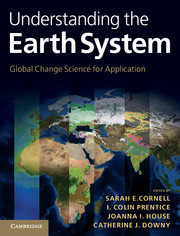Book contents
- Frontmatter
- Contents
- Editors
- Scientific editorial team members
- Contributing authors
- Foreword
- Preface
- Acknowledgements
- Units
- 1 Earth system science and society
- 2 Fundamentals of climate change science
- 3 How has climate responded to natural perturbations?
- 4 The Earth system feedbacks that matter for contemporary climate
- 5 Earth system models
- 6 Climate change impacts and adaptation
- 7 The role of the land biosphere in climate change mitigation
- 8 Society’s responses and knowledge gaps
- Acronyms
- Glossary of terms
- Index
- References
Preface
Published online by Cambridge University Press: 05 November 2012
- Frontmatter
- Contents
- Editors
- Scientific editorial team members
- Contributing authors
- Foreword
- Preface
- Acknowledgements
- Units
- 1 Earth system science and society
- 2 Fundamentals of climate change science
- 3 How has climate responded to natural perturbations?
- 4 The Earth system feedbacks that matter for contemporary climate
- 5 Earth system models
- 6 Climate change impacts and adaptation
- 7 The role of the land biosphere in climate change mitigation
- 8 Society’s responses and knowledge gaps
- Acronyms
- Glossary of terms
- Index
- References
Summary
Why have we written this book?
In 2001, the former chief executive of the UK Natural Environment Research Council (NERC), Sir John Lawton (Lawton, 2001), wrote:
One of the great scientific challenges of the 21st century is to forecast the future of planet Earth. …We find ourselves, literally, in uncharted territory, performing an uncontrolled experiment with planet Earth that is terrifying in its scale and complexity.
In the year that followed, the research council consulted widely among its scientists, policy stakeholders and the international research community about how to address that challenge. By the autumn of 2002, a plan of action was in place. The research council had earmarked a very substantial research budget for ‘Quantifying and Understanding the Earth System’, matched by an ambitious vision for the science that this research programme – QUEST – would address:
QUEST will seek to provide a more robust understanding of the global carbon cycle. QUEST will require partnerships, both within the UK, and between colleagues in Europe and the USA. NERC’s planned investment in QUEST is substantial. It has to be if we are really to make a difference. It is difficult to think of a more important thing to search for (NERC, 2002).
We, the authors of this book, have worked together over several years under the auspices of QUEST (Box 1). QUEST ran from 2003 to 2011, as one of several initiatives worldwide aligned with the internationally developed Earth system science agenda for collaborative research. The research programme sought to do more than ‘just’ provide a more robust understanding of the global carbon cycle, although interactions between biogeochemical cycles and climate have been at the heart of the programme.
Information
- Type
- Chapter
- Information
- Understanding the Earth SystemGlobal Change Science for Application, pp. xv - xxiiPublisher: Cambridge University PressPrint publication year: 2012
